_________________________________________________
Update From Pollitecon Publications
December 2021
_________________________________________________
Sign
up to receive Updates
Many top quality new books have been added to the Pollitecon Free
Ebooks Library so please read to the end in case you miss a good one.
Free Ebooks
The Truth About Macedonia and the Macedonians
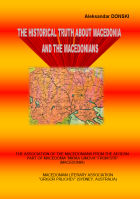 The
book The Historical Truth About Macedonia and the Macedonians by Aleksandar
Donski is now available in English. The book is a summary of Macedonia's
history from the ancient Macedonians through to modern times, and provides
a Macedonian perspective that readers would not gain from Greek texts.
It includes considerable discussion of the ethnic and cultural differences
between the Macedonians and Greeks, and refutes many claims about Macedonia
and Macedonians made by Greek propaganda. It also looks at the legacy
of the ancient Macedonians in today's Macedonian culture, the anthropological
connections between the ancient and present-day Macedonians, and the
current human rights situation of Macedonians in the divided parts of
Macedonia. The book is published by the Association of Macedonians from
the Aegean part of Macedonia "Mirka Ginova" of Stip, and the
Macedonian Literary Association Grigor Prlicev of Sydney. The book is
Here.
Earlier this year the book was published in Greek and this is available
Here.
The
book The Historical Truth About Macedonia and the Macedonians by Aleksandar
Donski is now available in English. The book is a summary of Macedonia's
history from the ancient Macedonians through to modern times, and provides
a Macedonian perspective that readers would not gain from Greek texts.
It includes considerable discussion of the ethnic and cultural differences
between the Macedonians and Greeks, and refutes many claims about Macedonia
and Macedonians made by Greek propaganda. It also looks at the legacy
of the ancient Macedonians in today's Macedonian culture, the anthropological
connections between the ancient and present-day Macedonians, and the
current human rights situation of Macedonians in the divided parts of
Macedonia. The book is published by the Association of Macedonians from
the Aegean part of Macedonia "Mirka Ginova" of Stip, and the
Macedonian Literary Association Grigor Prlicev of Sydney. The book is
Here.
Earlier this year the book was published in Greek and this is available
Here.
Macedonian Immigrants in Canada and Their Background
 Macedonian
Immigrants in Canada and Their Background is one of the best books available
on the Macedonian community in Canada. It is a large format book with
the names and photographs of many hundreds of Macedonian migrants to
Canada. Published in 1980, it is a rich, celebratory book with over
160 pages, 120 photos and is full of information, illustrations, articles,
poems, music scores, and memorabilia. There are many articles on the
migrants' villages in Macedonia, stories of migration to Canada, how
the community developed its organizations and businesses, and on Macedonia's
ancient and modern history, language, religion, folklore and traditions.
The book was compiled and published by the Macedonian Canadian Senior
Citizens Club of Toronto as 1978 marked the 80th anniversary of the
first Macedonian migrants to Canada. The aim of the book was to celebrate
this historic occasion, "clarify a few questions of who the Macedonians
are, and why they have made Canada their home", and convey the truth
about Macedonia and the Macedonians. The book is Here.
Macedonian
Immigrants in Canada and Their Background is one of the best books available
on the Macedonian community in Canada. It is a large format book with
the names and photographs of many hundreds of Macedonian migrants to
Canada. Published in 1980, it is a rich, celebratory book with over
160 pages, 120 photos and is full of information, illustrations, articles,
poems, music scores, and memorabilia. There are many articles on the
migrants' villages in Macedonia, stories of migration to Canada, how
the community developed its organizations and businesses, and on Macedonia's
ancient and modern history, language, religion, folklore and traditions.
The book was compiled and published by the Macedonian Canadian Senior
Citizens Club of Toronto as 1978 marked the 80th anniversary of the
first Macedonian migrants to Canada. The aim of the book was to celebrate
this historic occasion, "clarify a few questions of who the Macedonians
are, and why they have made Canada their home", and convey the truth
about Macedonia and the Macedonians. The book is Here.
This Land We Do Not Give
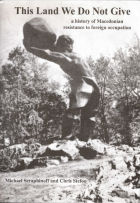 The
book This Land We Do Not Give co-authored by Michael Seraphinoff and
Chris Stefou (Risto Stefov) is now available in the Pollitecon Free
Elibrary. The book is subtitled A History of Macedonian Resistance to
Foreign Occupation. The authors say that in the book readers "will hear
the authentic voices of the people of Macedonia, voices that to this
day have been drowned out by the stronger voices of those Balkan neighbors
with territorial claims on the land of their Macedonian neighbors."
The book has an extensive discussion of the Ottoman rule in Macedonia
and the early Macedonian resistance through to the 18th, 19th and 20th
centuries. It includes the Macedonian rebellions from 1876 to 1881,
the Ilinden Uprising and its legacy, the Young Turk Revolt, the Balkan
Wars, World Wars One and Two, the Macedonian refugee children, and modern
Macedonia 1949 to 2001. The 272 page book was published in 2008 and
is now available as a free ebook Here.
The
book This Land We Do Not Give co-authored by Michael Seraphinoff and
Chris Stefou (Risto Stefov) is now available in the Pollitecon Free
Elibrary. The book is subtitled A History of Macedonian Resistance to
Foreign Occupation. The authors say that in the book readers "will hear
the authentic voices of the people of Macedonia, voices that to this
day have been drowned out by the stronger voices of those Balkan neighbors
with territorial claims on the land of their Macedonian neighbors."
The book has an extensive discussion of the Ottoman rule in Macedonia
and the early Macedonian resistance through to the 18th, 19th and 20th
centuries. It includes the Macedonian rebellions from 1876 to 1881,
the Ilinden Uprising and its legacy, the Young Turk Revolt, the Balkan
Wars, World Wars One and Two, the Macedonian refugee children, and modern
Macedonia 1949 to 2001. The 272 page book was published in 2008 and
is now available as a free ebook Here.
150 Immigrants to America Whose Race Was Defined As Macedonian in
the Early 20th Century
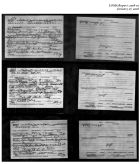 Documents
which prove that Macedonians in centuries past considered themselves
to be Macedonian and which refute Greek and Bulgarian propaganda about
the Macedonian identity continue to come to light. The 71 page report,
150 Immigrants to America Whose Race Was Defined As Macedonian in the
Early 20th Century, discusses 150 early migrants to the USA who insisted
that they were Macedonians and were recorded as Macedonians by immigration
officials. This was despite immigration officers often being "instructed
to record all Macedonian immigrants as being Bulgarian, Serbian, Greek,
Turkish or Romanian (Vlach) but not Macedonian". The report says "While
there are thousands of Macedonians whose race, ancestry, nationality,
ethnicity and/or language were defined as ‘Macedonian', we limited our
scope to America's northern entry points and a sampling of 150 Macedonians.
A number smaller than 150 names would allow deniers and discriminators
to suggest that Macedonians classifying themselves as ‘Macedonian' is
a fluke that does not necessarily indicate a mass attachment to the
ethnic Macedonian identity. However, a larger number would create a
more cumbersome report that would not do justice to the stories of these
Macedonian immigrants of the early 20th century. Thus, 150 is a happy
medium." The report includes photos of the immigrants' documents. The
report is by LOMA - The League of Macedonian Americans, and is Here.
Documents
which prove that Macedonians in centuries past considered themselves
to be Macedonian and which refute Greek and Bulgarian propaganda about
the Macedonian identity continue to come to light. The 71 page report,
150 Immigrants to America Whose Race Was Defined As Macedonian in the
Early 20th Century, discusses 150 early migrants to the USA who insisted
that they were Macedonians and were recorded as Macedonians by immigration
officials. This was despite immigration officers often being "instructed
to record all Macedonian immigrants as being Bulgarian, Serbian, Greek,
Turkish or Romanian (Vlach) but not Macedonian". The report says "While
there are thousands of Macedonians whose race, ancestry, nationality,
ethnicity and/or language were defined as ‘Macedonian', we limited our
scope to America's northern entry points and a sampling of 150 Macedonians.
A number smaller than 150 names would allow deniers and discriminators
to suggest that Macedonians classifying themselves as ‘Macedonian' is
a fluke that does not necessarily indicate a mass attachment to the
ethnic Macedonian identity. However, a larger number would create a
more cumbersome report that would not do justice to the stories of these
Macedonian immigrants of the early 20th century. Thus, 150 is a happy
medium." The report includes photos of the immigrants' documents. The
report is by LOMA - The League of Macedonian Americans, and is Here.
Before Alexander: Constructing Early Macedonia
 The
passing away of Professor Emeritus of ancient history, Eugene Borza,
on 5 Sep 2021 was a sad day for Macedonia and Macedonian scholarship.
Most famous for his books In the Shadow of Olympus and Before Alexander:
Constructing Early Macedonia, his writing was thoroughly researched,
honest, fearless and easy to read. To commemorate his passing, Pollitecon
Publications has added Before Alexander: Constructing Early Macedonia
to its Free Ebooks Library. The book discusses the origins, ethnicity
and institutions of the ancient Macedonians before and up to King Philip
II. Borza said "Like the Carthaginians and the Spartans, the Macedonians
are among the silent peoples of the ancient Mediterranean basin. Almost
everything we know about them derives from the written accounts of others,
and – as in the case of the Carthaginians and the Spartans – those written
accounts were either not well-informed or they were hostile, and occasionally
both." Professor Borza was firm that the Macedonians were simply Macedonians
– "I argued that the Macedonians emerged as a people recognized as distinct
from their Greek and Balkan neighbors... They made their mark not as
a tribe of Greeks or other Balkan peoples, but as Macedonians." His
emphasis. He also had a view on the modern political issue around Macedonian
identity – "I have attempted to show that those who claim that the Macedonians
were Greek have offered arguments in support of their views that were
unconvincing, both because those arguments rest upon flimsy evidence
and reasoning and because they oversimplify very complex matters of
determining the ethnicity of ancient people." Before Alexander: Constructing
Early Macedonia was published by the Association of Ancient Historians.
The book is Here.
The
passing away of Professor Emeritus of ancient history, Eugene Borza,
on 5 Sep 2021 was a sad day for Macedonia and Macedonian scholarship.
Most famous for his books In the Shadow of Olympus and Before Alexander:
Constructing Early Macedonia, his writing was thoroughly researched,
honest, fearless and easy to read. To commemorate his passing, Pollitecon
Publications has added Before Alexander: Constructing Early Macedonia
to its Free Ebooks Library. The book discusses the origins, ethnicity
and institutions of the ancient Macedonians before and up to King Philip
II. Borza said "Like the Carthaginians and the Spartans, the Macedonians
are among the silent peoples of the ancient Mediterranean basin. Almost
everything we know about them derives from the written accounts of others,
and – as in the case of the Carthaginians and the Spartans – those written
accounts were either not well-informed or they were hostile, and occasionally
both." Professor Borza was firm that the Macedonians were simply Macedonians
– "I argued that the Macedonians emerged as a people recognized as distinct
from their Greek and Balkan neighbors... They made their mark not as
a tribe of Greeks or other Balkan peoples, but as Macedonians." His
emphasis. He also had a view on the modern political issue around Macedonian
identity – "I have attempted to show that those who claim that the Macedonians
were Greek have offered arguments in support of their views that were
unconvincing, both because those arguments rest upon flimsy evidence
and reasoning and because they oversimplify very complex matters of
determining the ethnicity of ancient people." Before Alexander: Constructing
Early Macedonia was published by the Association of Ancient Historians.
The book is Here.
Macedonia - An Illustrated History
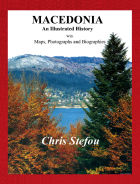 A
2005 book by Chris Stefou (Risto Stefov) titled Macedonia - An Illustrated
History With Maps, Photographs and Biographies is now available in the
Pollitecon Free Elibrary. True to its title, this is a large, 322 page
book with about 168 photos, maps and other illustrations that cover
all parts of Macedonian history from ancient to modern. The illustrations
also include portraits, coins, battles and weaponry, alphabets and more.
The author said the purpose of the book is to supplement his earlier
book History of the Macedonian People from Ancient Times to the Present,
which lacked illustrations, and "to give the characters human faces
and the cities and towns a place on the map". Another aim "is to present
the reader with a Macedonian perspective of Macedonia's history." The
book is Here.
A
2005 book by Chris Stefou (Risto Stefov) titled Macedonia - An Illustrated
History With Maps, Photographs and Biographies is now available in the
Pollitecon Free Elibrary. True to its title, this is a large, 322 page
book with about 168 photos, maps and other illustrations that cover
all parts of Macedonian history from ancient to modern. The illustrations
also include portraits, coins, battles and weaponry, alphabets and more.
The author said the purpose of the book is to supplement his earlier
book History of the Macedonian People from Ancient Times to the Present,
which lacked illustrations, and "to give the characters human faces
and the cities and towns a place on the map". Another aim "is to present
the reader with a Macedonian perspective of Macedonia's history." The
book is Here.
Heroes and Assassins
 The
well-known book Heroes and Assassins by Stoyan Christowe is now available
in the Pollitecon Free Ebooks Library. Published in 1935, the book discusses
some of the leading Macedonian revolutionaries from the period of the
Ilinden Uprising to the downfall of the Internal Macedonian Revolutionary
Organization (IMRO) in the 1930s. It gives great detail on the key revolutionaries
from Pirin Macedonia, and tells of the author's meetings and discussions
with Ivan Michailoff and Todor Alexandroff, among others. Christowe
discusses how for many years these revolutionaries were able to operate
autonomously in Pirin. But too many targeted assassinations resulted
in censure from the West and Bulgarian antagonism that led to the outlawing
of IMRO and the end to Macedonian freedom in Pirin Macedonia and Bulgaria.
Ultimately Christowe blames these events on France, which at the 1919
peace conference refused to give local autonomy to Macedonia. Christowe
was born in Ottoman Macedonia, now northern Greece, in 1898 and moved
to the USA in 1912. He taught himself English, studied journalism at
university, became a freelance writer then journalist and authored six
books. For 15 years he was also a politician – first in the Vermont
State House of Representatives and then the Vermont State Senate. The
book is Here.
The
well-known book Heroes and Assassins by Stoyan Christowe is now available
in the Pollitecon Free Ebooks Library. Published in 1935, the book discusses
some of the leading Macedonian revolutionaries from the period of the
Ilinden Uprising to the downfall of the Internal Macedonian Revolutionary
Organization (IMRO) in the 1930s. It gives great detail on the key revolutionaries
from Pirin Macedonia, and tells of the author's meetings and discussions
with Ivan Michailoff and Todor Alexandroff, among others. Christowe
discusses how for many years these revolutionaries were able to operate
autonomously in Pirin. But too many targeted assassinations resulted
in censure from the West and Bulgarian antagonism that led to the outlawing
of IMRO and the end to Macedonian freedom in Pirin Macedonia and Bulgaria.
Ultimately Christowe blames these events on France, which at the 1919
peace conference refused to give local autonomy to Macedonia. Christowe
was born in Ottoman Macedonia, now northern Greece, in 1898 and moved
to the USA in 1912. He taught himself English, studied journalism at
university, became a freelance writer then journalist and authored six
books. For 15 years he was also a politician – first in the Vermont
State House of Representatives and then the Vermont State Senate. The
book is Here.
Tvoreshtvoto Na Slave Katin
 For
his 80th birthday, one of Macedonia's most prolific authors and journalists
has been honoured with the book Tvoreshtvoto Na Slave Katin – The Publications
of Slave Katin. Author Dushan Ristevski says "Slave Katin is a fighter
for an independent, sovereign and united ethnic Macedonia and for the
unification of the Macedonian people outside and inside ethnic Macedonia,
especially in the Republic of Macedonia." The book "is an exhaustive
review of Slave Katin's works... He has authored sixty publications,
of which 22 have the name Macedonia, 19 monographs on celebrities from
the Diaspora and from Macedonia, 7 lexicographical editions, as well
as hundreds of scientific papers presented at various symposia, forums
and other gatherings, as well as about 5,000 journalistic texts published
in Macedonia and the world over." Tvoreshtvoto Na Slave Katin discusses
his books in five sections: The Macedonian Diaspora, which includes
all parts of Macedonia and all the places they now live; Church Life,
including ethnic Macedonia and the diaspora; Lexicographic Publications
including specialized dictionaries and books to help children learn
Macedonian and other languages; History Publications, which focus on
both ancient and modern Macedonian history; and Monographs, which focus
on successful and high achieving Macedonians in the diaspora. The book
is published by Makedonska Iskra in Skopje and the Macedonian Literary
Association "Grigor Prlichev" in Sydney. The book is Here.
For
his 80th birthday, one of Macedonia's most prolific authors and journalists
has been honoured with the book Tvoreshtvoto Na Slave Katin – The Publications
of Slave Katin. Author Dushan Ristevski says "Slave Katin is a fighter
for an independent, sovereign and united ethnic Macedonia and for the
unification of the Macedonian people outside and inside ethnic Macedonia,
especially in the Republic of Macedonia." The book "is an exhaustive
review of Slave Katin's works... He has authored sixty publications,
of which 22 have the name Macedonia, 19 monographs on celebrities from
the Diaspora and from Macedonia, 7 lexicographical editions, as well
as hundreds of scientific papers presented at various symposia, forums
and other gatherings, as well as about 5,000 journalistic texts published
in Macedonia and the world over." Tvoreshtvoto Na Slave Katin discusses
his books in five sections: The Macedonian Diaspora, which includes
all parts of Macedonia and all the places they now live; Church Life,
including ethnic Macedonia and the diaspora; Lexicographic Publications
including specialized dictionaries and books to help children learn
Macedonian and other languages; History Publications, which focus on
both ancient and modern Macedonian history; and Monographs, which focus
on successful and high achieving Macedonians in the diaspora. The book
is published by Makedonska Iskra in Skopje and the Macedonian Literary
Association "Grigor Prlichev" in Sydney. The book is Here.
Ilinden i Urugvaj
The book Ilinden I Urugvaj by Boris Miljovski is about the contemporary
responses to the Ilinden Uprising in 1903. It looks at what was reported
about Ilinden and how it was reported by the French agency Avas and
how the daily newspaper El Dija informed its readers in Uruguay. The
author was Yugoslav ambassador to Uruguay from 1976. At the National
Library he was surprised to find the daily newspaper El Dija every day
brought news and general information from Macedonia, about the struggles
of the Macedonian insurgents against the Turkish army, the politics
of the great powers, primarily Russia and Austria-Hungary, and the actions
of the Balkan countries, especially Bulgaria. These were sourced from
the French news agency Avas, today AFP. At the time this was the only
European news agency whose materials were published in Latin America.
He says the reporting was objective and sympathetic. The book is Here.
Spomeni I Sekjavanja za Vranjevci
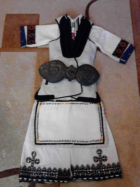 The
book Spomeni I Sekjavanja za Vranjevci or Memories from Vranjevci is
a monograph about the village of Vranjevci, located 17 kilometres east
of Bitola. The author, Bozhin Andonovski, says the first record of the
village is in Turkish documents from 1468. The book describes the location
of the village, the way of life, and many of the families that lived
in the village from 1950 to 1996/7, by which time the village was deserted.
Many left for work in Australia, America, Germany and other countries,
but there were also mass evictions after coal mining and energy company
REK-Bitola began excavations in the village. The book also describes
the traditions and customs of the population, the tools they used in
their work and daily life, how the religious holidays were celebrated,
and the folk costumes. The book is illustrated with a large number of
photographs including many old and recent photos of villagers and their
families. Published in 2016, the book has 222 pages, and is Here.
The
book Spomeni I Sekjavanja za Vranjevci or Memories from Vranjevci is
a monograph about the village of Vranjevci, located 17 kilometres east
of Bitola. The author, Bozhin Andonovski, says the first record of the
village is in Turkish documents from 1468. The book describes the location
of the village, the way of life, and many of the families that lived
in the village from 1950 to 1996/7, by which time the village was deserted.
Many left for work in Australia, America, Germany and other countries,
but there were also mass evictions after coal mining and energy company
REK-Bitola began excavations in the village. The book also describes
the traditions and customs of the population, the tools they used in
their work and daily life, how the religious holidays were celebrated,
and the folk costumes. The book is illustrated with a large number of
photographs including many old and recent photos of villagers and their
families. Published in 2016, the book has 222 pages, and is Here.
The Village of Brnik and its Demography
The paper Mestopolozhba na Brnik i Kratko za Demografskata Sostojba
na Seloto/ The Location of the Village of Brnik and Brief Information
on its Demography is now available in the Pollitecon Free Ebooks Library.
Brnik is located about 35 kilometres east of Bitola in the Mariovo region
of Macedonia. The first recorded mention of the village was in the 1570
Turkish census. The focus of the paper are the names of the families
and their members who lived in Brnik until the village was abandoned
in 2003/04. Brnik was always a small village and the author says that
most people gradually and voluntarily migrated to Australia, Bitola
and some surrounding villages. The 26 page paper, by Bozhin Andonovski,
was published in the book Proceedings of the Pelagon Cultural and Scientific
Meetings 2019. The paper is Here.
Families from the Village of Bach
The paper Rodoslovi Na Selo Bach/ Families from the Village of Bach
by Gjorgji Lazarevski is available from the Pollitecon Free Ebooks Library.
Bach is located about 20 kilometres south east of Bitola and close to
the modern-Greek border. It is a relatively new village with the first
settlement of that location believed to have been in the 18th Century.
The 24 page paper lists and names the extended families that live in
Bach. The lists include the parents, their children, sons and daughters-in-law,
their grandchildren and great grandchildren and their extended families.
The paper is an excerpt from the monograph Bach Makedonsko-Moshtenska
Naselba that was published in Bitola in 2009. The paper is Here.
Old Families from Oreovo
The paper Starite Oreovski Familii/ Old Families from Oreovo by Trajan
Mitrovski is available from the Pollitecon Free Ebooks Library. The
village of Oreovo is only a few kilometres south of Bitola. The 13 page
paper lists the families that lived in Oreovo from the second half of
the 19th Century until the World War I, and is based on births, deaths
and marriages data. The paper was published in the book Proceedings
of the Pelagon Cultural and Scientific Meetings in 2019. The paper is
Here.
Macedonian Folk Songs From The Repertoire Of Dragi Spasovski Volume
1
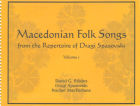 The
book Macedonian Folk Songs From The Repertoire Of Dragi Spasovski Volume
1 is a collection of 54 songs and their music from the repertoire of
singer Dragi Spasovski. The lyrics to the songs are in both Latinitsa
and Macedonian with an explanation in English. The volume has been compiled
by David G Bilides, Dragi Spasovski and Rachel MacFarlane. Mr Bilides
says the book is best enjoyed with the three CDs, which are sold separately
or in a discounted bundle of CDs and book. Macedonian Folk Songs From
The Repertoire Of Dragi Spasovski Volume 1 is Here.
The three CDs can be ordered Here.
The
book Macedonian Folk Songs From The Repertoire Of Dragi Spasovski Volume
1 is a collection of 54 songs and their music from the repertoire of
singer Dragi Spasovski. The lyrics to the songs are in both Latinitsa
and Macedonian with an explanation in English. The volume has been compiled
by David G Bilides, Dragi Spasovski and Rachel MacFarlane. Mr Bilides
says the book is best enjoyed with the three CDs, which are sold separately
or in a discounted bundle of CDs and book. Macedonian Folk Songs From
The Repertoire Of Dragi Spasovski Volume 1 is Here.
The three CDs can be ordered Here.
Mariovo - Zhiva Istorija
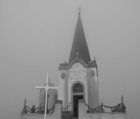 Mariovo
- Zhiva Istorija by Zoran Kosteski is a 360 page book that discusses
villages in the Mariovo region of Macedonia. Among these are Dunje,
Pestani, Veprchani, Gudjakovo, Rozhden, Vrpsko, Zhivovo, Vitolishte,
Melnitsa, Beshishte, Polchishte, Brod, Gradeshnica, Staravina, Dobroveni,
Zovic, Iveni, Brnik, Paralovo, Skochivir, Soich, Pisokal, Bonche, Podmol,
Krushejca and Chanishte. There is also a dictionary of lesser known
archaic words, and numerous articles. The book is Here.
Mariovo
- Zhiva Istorija by Zoran Kosteski is a 360 page book that discusses
villages in the Mariovo region of Macedonia. Among these are Dunje,
Pestani, Veprchani, Gudjakovo, Rozhden, Vrpsko, Zhivovo, Vitolishte,
Melnitsa, Beshishte, Polchishte, Brod, Gradeshnica, Staravina, Dobroveni,
Zovic, Iveni, Brnik, Paralovo, Skochivir, Soich, Pisokal, Bonche, Podmol,
Krushejca and Chanishte. There is also a dictionary of lesser known
archaic words, and numerous articles. The book is Here.
Macedonian and American-English: Analysis of Interference
Macedonian and American-English: Analysis of Interference by Danica
J Cvetanovska aims to identify and examine the use of language by different
generations of American-Macedonian speakers. The author says she aimed
to discover the essential tendencies and changes in Macedonian produced
by contact with American-English. She interviewed and talked with over
a hundred American-Macedonian speakers, most from New Jersey. They were
immigrants from Macedonia, Yugoslavia and the Macedonian regions in
Bulgaria and Greece. The 100 page paper is Here.
Sovremen Makedonski Jazik
Sovremen Makedonski Jazik is a 261 page discussion about the modern
Macedonian Language. The author, Dr Ruzha Panoska, says it was a textbook
for students studying the Macedonian language at the Faculty of Philology
at the University of Sveti Kiril I Metodi, was used as a teaching aid
by teachers of the Macedonian language in eight-year at high schools,
and is useful for people wanting to learn Macedonian. The book is Here.
More Free Ebooks
There are over 400 free ebooks in The
Pollitecon Free Ebooks Library.
Books by Other Publishers
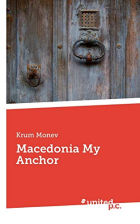 The
book Macedonia My Anchor by Krum Monev is now available in English.
Find out how the Bulgarian authorities treated this Macedonian freedom
fighter over many years of imprisonment and torture. Be prepared to
be shocked. Krum Monev was a Macedonian born in Pirin Macedonia and
spent a total of 16 years in prisons in Socialist Bulgaria for his political
activism. At one stage he crossed the border to Yugoslavia but was returned
to Bulgaria and more prison. Although prison life was cruel and at times
torturous, Monev's biography has been praised for its clarity, characters,
the beautiful descriptions of Pirin Macedonia, the depictions of chauvinism
in Bulgaria, and his enthusiasm for the Macedonian cause. The English
version can be ordered Here.
The Macedonian version is Here.
The
book Macedonia My Anchor by Krum Monev is now available in English.
Find out how the Bulgarian authorities treated this Macedonian freedom
fighter over many years of imprisonment and torture. Be prepared to
be shocked. Krum Monev was a Macedonian born in Pirin Macedonia and
spent a total of 16 years in prisons in Socialist Bulgaria for his political
activism. At one stage he crossed the border to Yugoslavia but was returned
to Bulgaria and more prison. Although prison life was cruel and at times
torturous, Monev's biography has been praised for its clarity, characters,
the beautiful descriptions of Pirin Macedonia, the depictions of chauvinism
in Bulgaria, and his enthusiasm for the Macedonian cause. The English
version can be ordered Here.
The Macedonian version is Here.
Otherworldly Tales Collected in 19th Century Macedonia by Marko
Cepenkov
 The
book Otherworldly Tales Collected in 19th Century Macedonia by Marko
Cepenkov: Selected and translated by Fay Thomev is now available from
amazon.com. The book was produced in collaboration with the Institute
of Folklore "Marko Cepenkov" in Skopje. Part 1 is titled Beliefs, spells,
the evil eye, healing remedies, scary stories, death rituals and lamentations,
and tall tales. Part 2 is Dreams and their interpretations. There are
also photos from the Jozef Obrebski collection at the University of
Massachusetts Amherst Libraries. Cepenkov developed a vast collection
of folklore from the 19th century, and Thomev has selected and translated
from the Macedonian 1972 edition of Cepenkov's 10 volume collection.
In 1991 Thomev translated the book titled 19th century Macedonian folktales
by Marko Cepenkov that was published by Macquarie University. The new
book can be ordered Here.
The
book Otherworldly Tales Collected in 19th Century Macedonia by Marko
Cepenkov: Selected and translated by Fay Thomev is now available from
amazon.com. The book was produced in collaboration with the Institute
of Folklore "Marko Cepenkov" in Skopje. Part 1 is titled Beliefs, spells,
the evil eye, healing remedies, scary stories, death rituals and lamentations,
and tall tales. Part 2 is Dreams and their interpretations. There are
also photos from the Jozef Obrebski collection at the University of
Massachusetts Amherst Libraries. Cepenkov developed a vast collection
of folklore from the 19th century, and Thomev has selected and translated
from the Macedonian 1972 edition of Cepenkov's 10 volume collection.
In 1991 Thomev translated the book titled 19th century Macedonian folktales
by Marko Cepenkov that was published by Macquarie University. The new
book can be ordered Here.
Australian-Macedonians and their language(s)
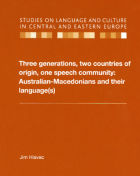 The
book Three generations, two countries of origin, one speech community
- Australian-Macedonians and their language(s) by Jim Hlavac examines
Macedonian as a transposed, immigrant language in Australia. The book
focuses on Macedonians from both Aegean Macedonia and the Republic of
Macedonia. It has 560 pages and looks at the use of Macedonian in a
variety of daily settings such as home, work, church and socially as
well as inter-generationally. It says that Macedonian is the twelfth
most widely spoken language and one of the best maintained minority
languages in Australia. The author is Senior Lecturer in Translation
and Interpreting Studies in the School of Languages, Literatures, Cultures
and Linguistics at Monash University. The book is edited by international
academic, Professor Christian Voss, and published by Biblion Media in
Germany. The book is published by Peter Lang, Berlin. E-book and paperback
versions can be purchased Here.
Hardback versions of the book can be ordered (postage costs included)
from the author by email Here.
The
book Three generations, two countries of origin, one speech community
- Australian-Macedonians and their language(s) by Jim Hlavac examines
Macedonian as a transposed, immigrant language in Australia. The book
focuses on Macedonians from both Aegean Macedonia and the Republic of
Macedonia. It has 560 pages and looks at the use of Macedonian in a
variety of daily settings such as home, work, church and socially as
well as inter-generationally. It says that Macedonian is the twelfth
most widely spoken language and one of the best maintained minority
languages in Australia. The author is Senior Lecturer in Translation
and Interpreting Studies in the School of Languages, Literatures, Cultures
and Linguistics at Monash University. The book is edited by international
academic, Professor Christian Voss, and published by Biblion Media in
Germany. The book is published by Peter Lang, Berlin. E-book and paperback
versions can be purchased Here.
Hardback versions of the book can be ordered (postage costs included)
from the author by email Here.
Stay Airbnb Home in Neret/ Polipotamos

Visiting Neret/ Polipotamos and the Lerinkso region is now easier as
there is an Airbnb house in Neret available to rent. The property was
developed by Perth businessman Jim Bivoltsis, who was born in the village.
The original stone house has been fully renovated with modern bedrooms,
kitchen, bathroom and laundry. It is one of the first houses as you
enter the village and is only a minute or two's walk to the centre of
the village, the main church and the two tavernas. It is on the side
of the hill with the river below and great forest views across to the
other side of the valley. There is wi-fi and offstreet parking for two
cars. There is more information Here.
Macedonia Needs Macedonians

Please remember that Macedonia Needs Macedonians. The Facebook page
for the Macedonia Needs Macedonians group is Here.
Two major tourism portals are Travel2Macedonia which is Here,
and Macedonia - Timeless which is Here.
Canadian Macedonian Books
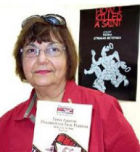 A
reminder that Canadian Macedonian Books has a great selection of Macedonian
books in English from around the world. These include non-fiction, fiction,
children's and cook books. Canadian Macedonian Books is run by Virginia
Evans, a former co-president of the Canadian Macedonian Historical Society
and founder of the Macedonian Film Festival in Toronto. Canadian Macedonian
Books is Here.
A
reminder that Canadian Macedonian Books has a great selection of Macedonian
books in English from around the world. These include non-fiction, fiction,
children's and cook books. Canadian Macedonian Books is run by Virginia
Evans, a former co-president of the Canadian Macedonian Historical Society
and founder of the Macedonian Film Festival in Toronto. Canadian Macedonian
Books is Here.
Sign
up to receive Pollitecon Updates
Thank you
Victor Bivell
Pollitecon Publications
PO Box 3411
Wareemba NSW 2046 Australia
Ph 02 9705 0578
Email vbivell @ pollitecon.com
Web http://www.pollitecon.com
More Updates

